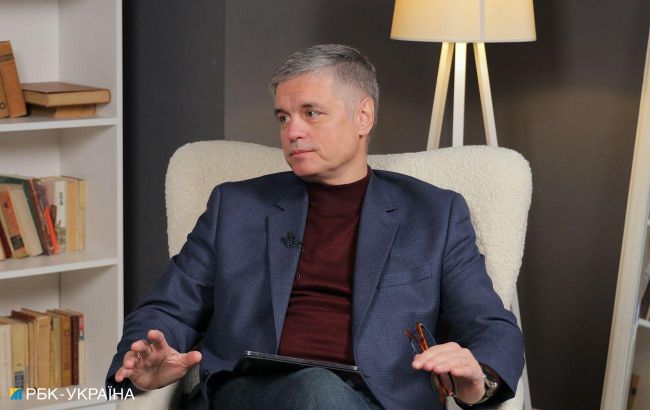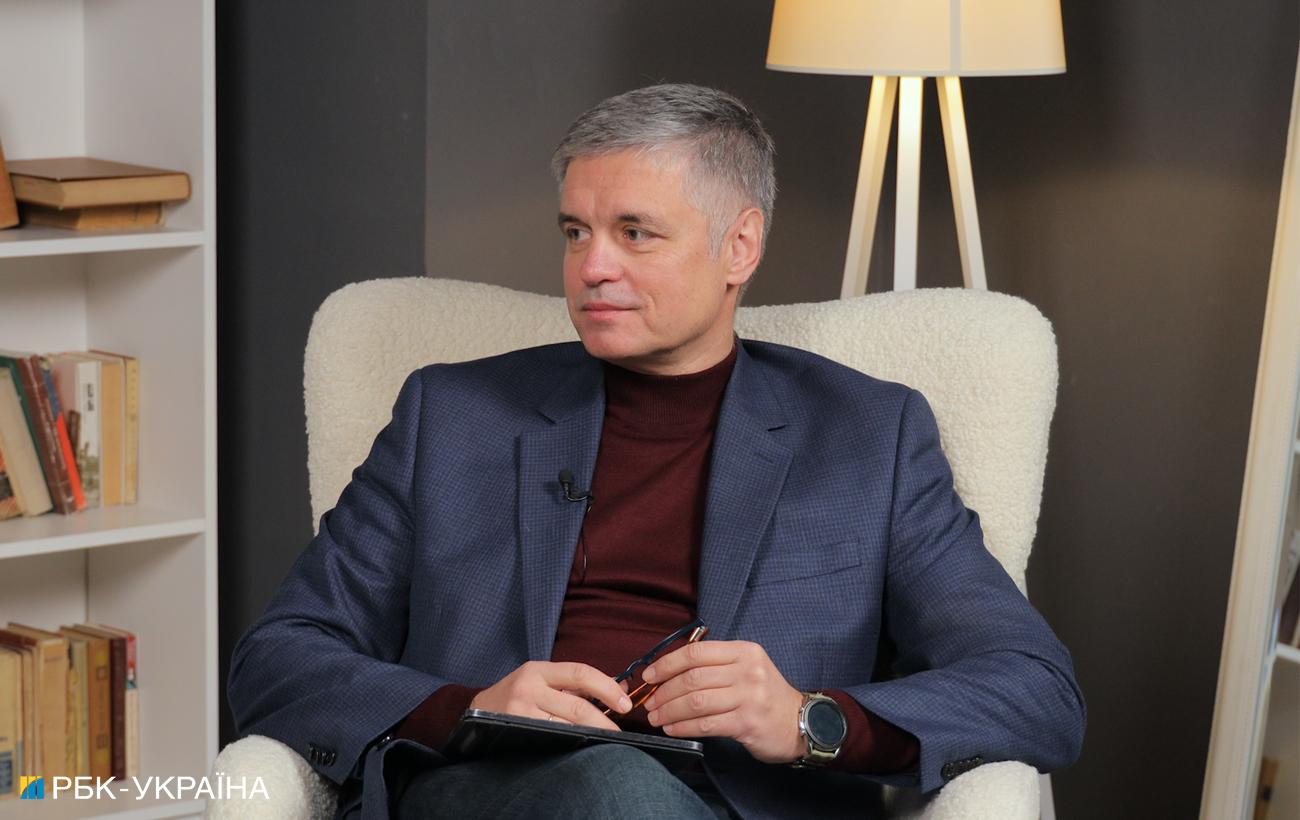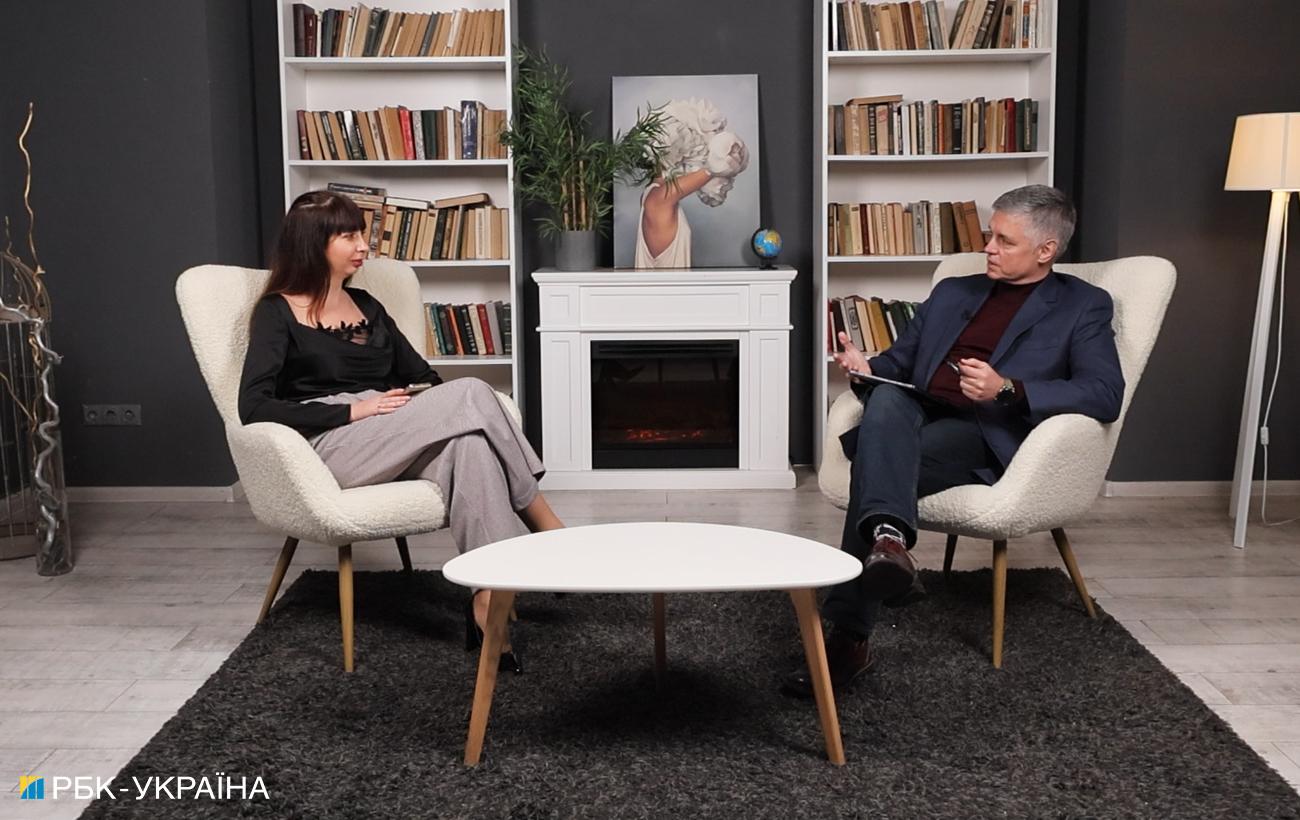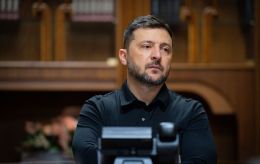Former Ukraine's Foreign Minister: 'Ukrainian President's name doesn't matter, Russians hate us all'
 Vadym Prystaiko (Photo by RBC-Ukraine)
Vadym Prystaiko (Photo by RBC-Ukraine)
Vadym Prystaiko, former Foreign Minister of Ukraine and former Ambassador of Ukraine to the United Kingdom, spoke about Valerii Zaluzhnyi's tasks as Ukraine's Ambassador to the UK and about Volodymyr Zelenskyy's only meeting with Putin in an interview with RBC-Ukraine.
Contents
- UK government's support for Ukraine
- Zaluzhnyi's work as Ambassador to UK
- Relationship between Trump and Zelenskyy
- First and only meeting between Zelenskyy and Putin
Vadym Prystaiko served as Minister of Foreign Affairs in the government of Oleksii Honcharuk and was present during the first meeting between Volodymyr Zelenskyy and Donald Trump, as well as the only meeting between Zelenskyy and Putin.
In an interview with RBC-Ukraine, Prystaiko shared his view of whether Trump resents Ukraine because he was almost impeached after a phone call with Zelenskyy in 2019, what Putin wanted to get from Zelenskyy, and what should be the basis of Ukraine's future agreements with Russia. He also spoke about the main tasks facing Valerii Zaluzhnyi in the UK and why it is much more difficult for the former Commander-in-Chief to work as an Ambassador than for Prystaiko himself.
UK government's support for Ukraine
Vadym Prystaiko served as Ukraine's Ambassador to the United Kingdom from 2020 to 2023. He recalls that the British emphasized that there would be a big war the whole year before Russia's full-scale invasion of Ukraine. Official London spoke freely about the threat from Russia, unlike, for example, France and Germany, which were bound by the Minsk and Normandy format negotiations.
“I was asked constantly: “Don't you realize that war is about to happen? We are watching what your leadership, your television, your news agencies are saying, and we have a feeling that you simply do not realize the danger you are in.” They understood that Ukraine had to put on a good face when it was playing a bad game and say, “Listen, we can't say that there will be a war tomorrow, otherwise there will be no investment. My British colleagues replied that investments are not sent because someone watches Ukrainian television. Investments come from the West, and they watch primarily Western television, which has been saying for a year that war is inevitable. And that is why there will be no investment, no matter what your leadership says. Either they want to play a positive game or they are running to build trenches.”
After the start of the full-scale Russian invasion, the British continued to emphasize the need for military assistance to Ukraine.
“Even if they were planning to interact with some next pro-Russian government, believe me, they would have been quietly planning it in some dark rooms. But openly they said the opposite. It was a unification of society, the government, and eventually even the crown, which has not interfered in secular political affairs for centuries. And there was only one signal: Ukraine must win, Russia must lose. It was as simple as that. There were talks about the fall of Kyiv, the fact that Kyiv might fall, and so on. And I remember meeting with MPs, lords, and seeing in their eyes: good people, they don't have much time left.”
Two weeks before Russia's full-scale invasion of Ukraine, Vadym Prystaiko flew to Kyiv with then-UK Prime Minister Boris Johnson.
“One of the results was the supply of weapons that arrived just a few days before Russia's full-scale invasion of Ukraine. Airplanes arrived at Boryspil. If they hadn't arrived, it's hard to imagine how we could have survived the first days when those columns of tanks were just moving towards Kyiv.”
This was the first visit of the UK Prime Minister to Ukraine since 1996.
“We can honestly recognize where Ukraine was on the list of UK priorities. With the arrival of Boris Johnson, there were radical changes, in particular, probably because he was the foreign minister before and had been to Kyiv a couple of times. He already knew Kyiv, he understood why Ukraine was important, and when he became prime minister, our problems fell on a prepared background. For a long time, they (the British - ed.) did not believe in us, they did not see the prospects of building this project, and the project in their eyes looked like this: a post-Soviet, Slavic, Orthodox state, post-communist, claiming to be democratic, a member of NATO and the EU, and this was perceived with some caution. They saw how thorny our path was: corruption scandals, and political turmoil. And it took our country many, many years to convince them that we were not just worthy of attention, but would become like everyone else. But the most important thing is the unconditional courage with which the Ukrainian people decided to resist (Russia - ed.). It made a huge impression.”
Zaluzhnyi's work as Ambassador to UK
Vadym Prystaiko worked in the UK for three years, although the usual term of an ambassador is five years. Then the position was vacant for a year until former Commander-in-Chief Valerii Zaluzhnyi was appointed ambassador to London.
“How does this happen normally? When an ambassador's term expires, the documents for a new ambassador are prepared in advance to minimize the period when there is no high representative who could meet with ministers and MPs. Unfortunately, there was a gap of about a year between me and Valerii Zaluzhnyi. That is, for a year during the war, our country was without an ambassador to the UK. This is an extremely long time. For example, I replaced my colleague in London on the same day. She flew out in the morning, I was already at the airport in the evening, the embassy met me, and we started working the next day - there is so much work to do in London. To wait for a year is just not good enough. According to the Constitution, the Minister of Foreign Affairs makes proposals, and the president makes the decision. That is, the ambassador is an envoy of the head of state, in our case, the president. There are many versions of why this happened. It makes no sense to guess anymore, it was so long ago. Most often it is connected with my interview with Sky News.”
It is the interview Vadym Prystaiko gave after the NATO summit in Vilnius in July 2023. At the time, UK Defense Secretary Ben Wallace said that Ukraine should be more grateful for the assistance provided, to which Zelenskyy responded: “We can wake up in the morning and thank the minister personally.” Commenting on Zelenskyy's words, Prystaiko called them “unhealthy sarcasm” and suggested that Ukraine should not show Russia that there are any misunderstandings between us and our partners.
“Valerii Zaluzhnyi, as the head of the Ukrainian diplomatic mission, must now do everything to ensure that Ukraine remains on the UK's domestic political radar. The only difference between his role and mine is that he has such a direct, very interesting experience for understanding what modern warfare is, and what the modern war with Russia is. The image of a general who defended the state for three years and was at the head of the defense is a very important resource that should be exchanged for support of Ukraine.”
Valerii Zaluzhnyi enjoys great authority among the British military, and the kind of assistance Ukraine receives directly depends on them, says Prystaiko. But on the other hand, Zaluzhnyi's job is much harder now than it was in the first months of the war. In 2022, many people acted on emotions, and everyone from ordinary Britons to huge companies (such as Rolls Royce) and the royal family wanted to help Ukraine.
“The head of the Royal Mail called and said: “How many cars do you need to transport humanitarian aid to Ukraine? Will 30 cars with a constant rotation to Ukraine be enough for you?” I said: “Thank you, that's fine.” There were cases when Deutsche Bahn, the German railroad in London, offered to transport generators - they just gave us a train, they gave us airplanes. At one stage, the mayor of London asked me to meet with him because there were so many collection points for Ukraine all over London that it was getting out of control. He gave us a huge workshop where we started collecting this aid because people were bringing everything from medicines, cans of peas, computers, and bicycles. It was such an uplifting experience, such a help to Ukraine, that now I'm sorry that the current generation of ambassadors, including Zaluzhnyi, can no longer count on these emotional charges.”
Relationship between Trump and Zelenskyy
In the government of Oleksii Honcharuk, Vadym Prystaiko served as Minister of Foreign Affairs. He accompanied Volodymyr Zelenskyy during his first meeting with then-US President Donald Trump in the fall of 2019.
“At the time, Trump was perceived as a rather original president who had never been there - a completely out-of-system person. But by that time, he had already been in power for a couple of years and began to be perceived as an old-style representative. And here we have a new President Zelenskyy, who also represents an anti-systemic wave that has already washed away many in the United States and is now rolling across Ukraine. There was a sincere interest (in Zelenskyy - ed.) in what kind of person he is, where this will lead, what kind of people are around him, and how is this even possible. Although they came on the same wave of populism and change of everything that existed before.”
This trip to the United States took place after the infamous phone conversation between Trump and Zelenskyy, during which the American president allegedly pressured his Ukrainian counterpart to have Ukrainian law enforcement agencies charge Joe Biden and his son Hunter, who previously worked for a Ukrainian energy company, with corruption.
By doing so, Trump allegedly hoped to eliminate Joe Biden, his main rival in the 2020 presidential election, from the race. To make Zelenskyy more likely to accept Trump's demands, an hour and a half after the phone call, the White House froze $400 million in financial aid to Ukraine. This caused a major international scandal and almost led to Trump's impeachment. Vadym Prystaiko says that it is unlikely that Trump has forgotten about this scandal even after five years.
“I'm afraid that Trump will not be able to forget that there have been two attempts to impeach him. This has never happened before in the history of the United States. He's the first, and it's all connected to Ukraine. You don't forget something like that easily. Whether we are to blame for this is a difficult question. It was the democratic part of the political system that wanted accountability from its republican president, believing that he wanted to put pressure on a foreign government. So we were just a victim of a domestic political scandal. If we had been more careful, we might have been able to avoid it. For example, we did not need contacts with Giuliani (Trump's lawyer - ed.) as an unofficial representative of President Trump.”
 Photo: RBC-Ukraine
Photo: RBC-Ukraine
Regarding Trump's promises to end the war quickly, Vadym Prystaiko believes that the newly elected US president does not have a clear plan on how to do so. But different members of his team are presenting him with their vision of ending the Russian-Ukrainian war.
“There are a lot of plans that are now trying to be presented, each with their plan running to the great leader and saying: “Here, look, I have a plan, I will implement it.” Some of those who proposed (plans - ed.) have already left the team. And obviously, their plans will not be implemented. We regret that this is not, for example, Pompeo's plan, which included our joining NATO and assistance. We hope that the plan we are now afraid of will also change the normal direction.”
However, Prystaiko says that we should not expect revolutionary steps from the Trump administration. After all, the United States considers itself responsible for the fate of all humanity, not just Ukraine. Therefore, crossing the so-called red lines is unacceptable for them. And their main task is to prevent a nuclear war, even if it means sacrificing Ukraine.
“The survival of all mankind is so important that we will probably have to explain to Ukraine that no one will bring it to Armageddon. The biggest problem is that Putin is also aware of this, and he plays on these feelings, not having the same responsibility in his mind as the United States. What makes Russia different from the Soviet Union? There were plenty of people with hot blood and idiotic ideas there, too. But as one of the pillars of the world, they shared a kind of conditional responsibility for the entire civilization, for the entire planet. Putin is now deliberately playing on the fears of the United States, demonstrating that it is not his planet. Remember what he said: "What do we need the Earth for if there is no Russia on it?" Well, sorry, you don't need it, but we still need the Earth.”
On the other hand, Prystaiko says, the caution of the West, led by the United States, is leading to the spread of nuclear weapons across the planet, the technology of which the Kremlin shares, for example, with Iran and North Korea. And no one will give up nuclear warheads voluntarily, because everyone sees how the United States “protected” Ukraine, which gave up its weapons in exchange for security guarantees.
First and only meeting between Zelenskyy and Putin
Vadym Prystaiko also accompanied Volodymyr Zelenskyy in Paris during his only meeting with Putin. However, Prystaiko refuses to share the details of these negotiations, saying it is not yet time to talk about them.
“I can say that it was an attempt to talk. President Zelenskyy sincerely believed that he would somehow be able to convince President Putin that it was possible to talk to us. As a person who had never been involved in politics, let alone security, he did not realize that the issue was not with us. We can have any name of the Ukrainian president: Yanukovych, Yushchenko, Zelenskyy, or Poroshenko. It does not matter. They sincerely hate us all. So, you can show flexibility, you can try to bring positions closer together, but sooner or later they (the Russians - ed.) will still want to do what they are doing. I think that since the first meeting (with Putin - ed.), Volodymyr Zelenskyy has gained political experience, and the clash with Russia, and especially the war, has put everything in its place.”
The Russians, for their part, hoped that Zelenskyy could be drawn to their side, and he would not be a Ukrainian president but a Russian governor of Ukraine. And he would have even less political will than Yanukovych.
“They were not happy with Yanukovych. In the end, they did not want him to run away and live in Rostov. Why do they need Yanukovych in Rostov? They need Yanukovych in Ukraine. Do you remember how Yulia Volodymyrivna (Tymoshenko - ed.) used to say: “Come to your senses! Rostov is not rubber!” Why do they need to increase the Syrian or Ukrainian diaspora in Rostov? They need them locally. They believed that a non-systemic person who has no clear established vision and no contacts either in the military elite or in the intelligence and counterintelligence elite, in expert circles, would finally come to power, and it would be faster and easier with him. But even six months of President Zelenskyy's tenure have revealed a lot to him, that not everything is, unfortunately, as simple as in the movie, and it will not be possible to solve everything so easily.”
At that meeting, Prystaiko recalls, Putin failed to get what he wanted from Zelenskyy. And that's why he refused to hold further talks with the Ukrainian president.
“I'm surprised why the Russians don't realize that this is a Ukrainian president, after all. They may or may not like him, but he is our president, not theirs. And they decided to solve this issue differently. It didn't work out in a good way, as they see it, so we're going to solve it evilly. Again, counting on President Zelenskyy's inexperience and the general imbalance of the political system, which has experienced a transition from standard, established procedures to new ones. They believed that at this moment our state was very weak. They did the same thing in 2014, when immediately after the revolution, when we had no president, no one knew who was responsible for what, who gave commands to whom. They also believed that (in 2022 - ed.) the time had come. As you can see, it didn't work either. If anyone had any doubts, including our neighbors, that we are a state, they are learning this now at great personal cost and with huge financial and human losses.”
Prystaiko is sure that the time for negotiations has not yet come. But, the diplomat continues, it is not necessary to wait until we regain the borders of 1991 to sit down at the negotiating table.
“Diplomats often define peace or victory as a state better than before the war. In other words, as a result of our war, we should be in a better position than we were before. Our future agreements should be based on guarantees that our children and grandchildren will not have to fight.”


